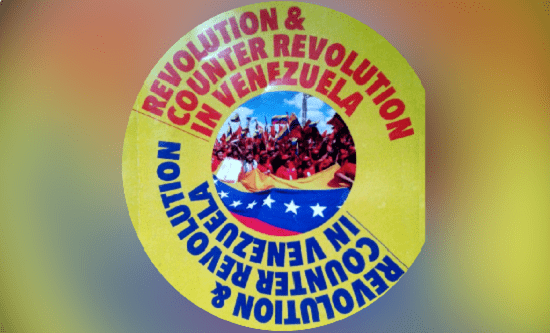
Revolution & Counter-Revolution in Venezuela by Alison Bodine (Fire This Time)
178pp Battle of Ideas Press, 2018
US/CAN $10 or Europe €6.5
On 23 January 2019, a little-known Venezuelan MP, Juan Guaido, appointed himself as interim president of the country, in an attempt to replace the legitimate president Nicolas Maduro. Minutes later, the US government published a statement in support of Guaido. Soon after, a group of Latin American and European countries followed suit. The mainstream media corporations hailed him as a saviour for Venezuela. Britain, Germany, France and Spain declared that unless Venezuela held elections in eight days, they would recognise Guaido as president. What they all purposefully ignored, however, is that free and fair elections had taken place on 20 May 2018. Maduro won the most votes, and Juan Guaido’s party chose not to run. With this confusing sequence of events, it is necessary for us to understand Venezuela’s context, as reactionaries are hurriedly calling for a foreign ‘humanitarian intervention’, whatever that may be.
In the book Revolution & Counter-Revolution in Venezuela, Alison Bodine tells us that ‘the context of Venezuela today is imperialist intervention… nothing more and nothing less’. (p. 63) As clear as that – although Bodine in fact raises another key factor: ‘Venezuela today is in the throes of a sharp class struggle.’ Revolution & Counter-Revolution in Venezuela is a compilation of nine articles written by Bodine in the Vancouver-based newspaper Fire This Time. The common theme: explaining what is happening in Venezuela today, from the perspective of a socialist in Canada. Why this perspective? Because Bodine doesn’t write morning headlines but calls the Canadian working class to action.
The articles are written in the same style as the title of the book anticipates. Bodine does not hesitate to call the left-wing Bolivarians or chavistas ‘revolutionaries’ and their right-wing opposition ‘counter-revolutionaries’. Bodine clearly exposes the facts that explain what led to the general crisis that we now see Venezuela. In Britain, where we publish FRFI, almost all the mainstream media agree that Venezuela is in ruin because of an authoritarian president and an incompetent administration. That is, including the liberal flagships of the BBC, The Guardian and The Independent, as Robert Clough pointed out in the FRFI review of Propaganda Blitz: How the corporate media distort reality.
What can we say of the journalists who refuse to acknowledge the sustained, overt and covert attacks against Venezuela’s people and government? Bodine does a great service by exposing the US, EU and Canada-imposed sanctions, the food hoarding of private Venezuelan import companies, the vicious violence of the opposition’s actions and the surreal coverage from the mass media corporations. The fifth article is titled ‘What is the discussion really?’, as the author criticises the hypocrisy of US and Canadian media and government officials. As Bodine tells us, on 30 July 2017, Venezuelans elected the National Constituent Assembly, a new parliament with the task of producing a new constitution. Since then the US, Canada and EU have escalated their threats and sanctions, claiming that Venezuela is on the path to become a dictatorship. The sanctions have meant a heavy blow on exports for Venezuelan state-owned oil company, a vital source of revenue for the country. On top of this we must add the military threats from Donald Trump and the already common unofficial attacks. Then, journalists publish figures of a crumbling Venezuela, of increasing hardship. This cues in imperialist politicians and their right-wing Latin American allies to call for heavier intervention, damaging Venezuela further.
What is, therefore, the common interest that Donald Trump, Justin Trudeau, the EU and the Latin American right have in Venezuela? As previously mentioned, the author is clear about a division between imperialist and oppressed countries and of a struggle between classes. If this sounds too abstract, Bodine has some very clear examples of why Canada is so concerned with Venezuela in Chapter 2. The author explains that when Hugo Chavez was elected in 1998, the new government put the interests of the people, such as free, quality education, housing and healthcare, at the forefront. However, as Bodine says it is only possible by ‘harnessing the power of Venezuela’s natural resources’, (p. 32) meaning the nationalisation of foreign-owned companies. What this meant for Canada, in practical terms, is that in 2011 two of its corporations lost their access to mines on Venezuelan soil. It should then come as no surprise that the Canadian ruling class is imposing sanctions on Venezuela and financing opposition groups – for example the Canadian government ‘at least $22,000’ to a Venezuelan opposition group called Sumate (p. 54).
On top of the direct economic interests of corporations, Venezuela poses a special danger to the imperialists and capitalists of the world. Bodine tells us how the Bolivarian process is empowering indigenous and black Venezuelans, workers, peasants, women, what she calls ‘the poor, working and oppressed people’. Bodine reminds us that when the US and the Organisation of American States call for democracy and respect for human rights in Venezuela, they do so with a history of sponsoring dictatorships and paramilitary groups. As the Canadian government condemns Venezuela through Twitter, it covers up its own continuing human right abuses against indigenous people. If there is one recurring theme in all of Bodine’s nine articles, is that progressives must stand in solidarity with Venezuela as it faces attacks from imperialists and the local right wing.
As the author asks in the subtitle: in the struggle between revolution and counter-revolution in Venezuela, which side are you on?
Elias Haddad




